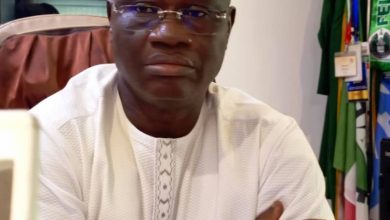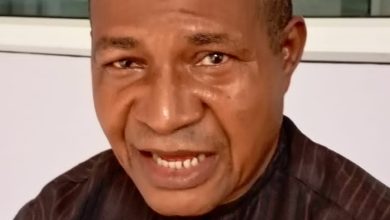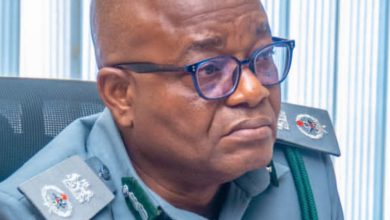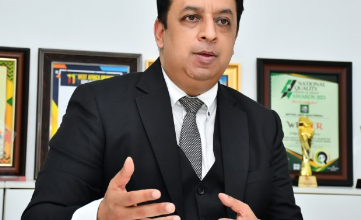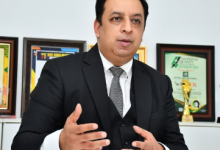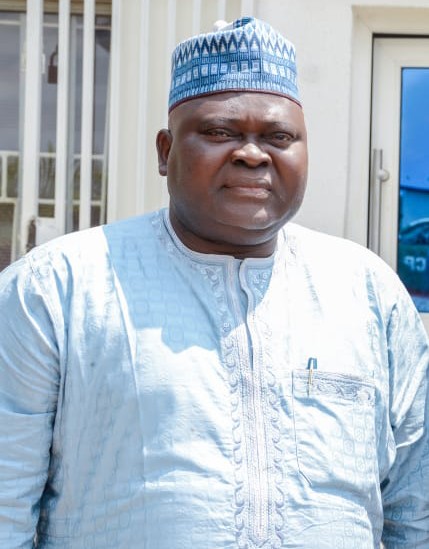
Rotimi Raimi Hassan, General Manager, Kaduna Inland Dry Port talks about the investment and challenges faced in operating it.
He described political will as a major issue in making dry ports work better in Nigeria
Raimi spoke exclusively to JournalNG
Except
Give us an overview of Kaduna Dry Port performance in 2022 and what we expect of it in 2023.
In 2022, our performance compared to 2021 was about 15% less and the reason behind that is the implication of COVID-19 and the Russian and Ukraine war. The reason I’m saying this is that in June, things started increasing in terms of forex. Importers didn’t have access to forex, so we had to go through the secondary market. The secondary market keeps increasing and it is difficult for importers to plan, because if it keeps on increasing, and then comes down, it will affect their businesses.
In addition to that, the federal government opened the land border that has been closed for almost 3 and half years which is not good for us. Although it is good in the sense that smuggling will reduce. But now that the border is opened, people have gone back to the border to bring in goods. They are saying that in every good brought in, they can make close to 500,000 to one million reductions in terms of cost. Also, the Customs duty rate keeps on increasing without notification; coupled with the election. People are focused on election throughout last year with campaign, and we are still experiencing same this year. These are what causes the increase. With all these, it is very difficult to plan. We were targeting that with COVID-19 gone, 2022 would have been a better year for us to recoup losses in 2020 and 2021, but that wasn’t the case.
Kaduna Inland Dry Port was set up to solve the problem of access to port for hinterland like the northern part of the country, to what extent have you been able to do that, and how do you think your ranking is among other dry ports that are springing up in the country?
Kaduna Inland Dry Port is number one in West Africa. When you talk of dry port, it is the first in the region, and I can beat my chest and say that they we’ve been number one or two in Africa. Starting a dry port is a very good, it helps the economy improve and enhance business activities within that region. It reduces the cost of moving down to the coastal line to clear goods. A dry port also has a multiplier effect by creating employment and empowering people. The federal government has done well in boosting the economy of the area it is located, and Kaduna Inland Dry Port happens to be number one. I have been privileged to travel out of this country to witness how dry ports are been run in Durban and Johannesburg, South Africa.
What I discovered there is that the political will to back the operation of dry port is not there; in the sense that it should be given the opportunity to operate solely as a dry Port should to have a seamless operation. From the seaport (transit port) to the dry port, we are facing serious problems in terms of documentation, double handling of activities, and in terms of movement too. Every dry port must have rail access from the seaport to the dry port, so that the transportation involved in moving goods from point A to B that will be cheaper to assist and support shippers in the hinterlands.
What is the essence of having the dry port? it’s to assist the shippers and to decongest the port. And if government has that aim to decongest the port, all the things that will make it work should be put in place. Also, government should form a monitoring team to check their performances; we are just like a new baby. But for the past five years we are still operating using a bonded terminal approach to move our goods, and I keep saying that government should look into it.
There is no Customs template for ICD to operate; there should be modus to use for goods coming to the dry port to have free access of evacuation to the dry port, not that you use a transire and face so many hurdles with security for clearance of goods, whereas the same agencies as NAFDAC, NDLEA, SON are already in the dry port. You face same 100% physical examination process like in the seaport to move the same goods before it got to the dry port to ensure compliance with the statutory policies of the different agencies. the bottom line is that it is serious time wasting.
The government should look into shipping company too, because shipping company in Lagos do not allow their busses to come to the north due to security reasons and the risk involved, they do not see it as good business. There should be a policy to all the stakeholders to do everything possible to allow free passage of goods going to dry ports. Customs have what it takes to ensure that the goods are not diverted, because when the container is coming, they still provide escort for the cargo. And when the container leaves, the counterpart here already know that the container is coming, and they are there to receive the cargo because we have resident Customs; ours is to provide storage and ensure the goods are intact before the examining is done; the duty is paid, and they release to us. You will discover that the interpretation is so simple, but the movement from the seaport to the hinterland is the problem, which I believe the government have to look into.
So, there are three major things government needs to look into; the Customs process, the shipping companies to key in and recognise all the dry ports, and lastly the Nigerian Railway Corporation to provide loco and wagon, which we are short of to reduce the cost of transportation. Imagine a container coming to the north is about N1.8 million to over N2 million, and it’s quite expensive. Whereas if it is going by rail, we go with 20 by 40; at worst it won’t cost more than N700,000, so you can see the difference in price, making a lot of importers stay away. I must tell you the truth, it pains we the investors because we are losing money, same as the government. If the railway corporation is up and running, they will be making a lot of revenue from rail cargo. It will make a lot of money for them than the passenger train. Other dry ports are coming and they’re learning from the first dry port. The Nigerian Shippers Council under Federal Ministry of Transportation, which is our regulator is trying its best in this regard. They’ve organised many workshops to see that things work out, but we still need the political will to back it up.
You said that the Nigerian Shippers Council have tried their best. To what extent has the Nigerian Shippers Council helped the KIDP? What are the direct achievements?
Nigerian Shippers Council is our regulator; it regulates port activities. What I mean is that when we report issues to them, they take it to the government. We as the operators and investors need to do more, and we can only do this through the press, because even if you write to the government, they will look at it, which takes time. But if there is communication through the press, they will look into it and do something about. We are losing a lot of money, because when an importer looks at the cost of importation, he won’t bother coming to you the second. Those into finished goods might decide to use a lorry to send it down to Kano or Kaduna. it is only raw materials that you cannot just move anyhow. Most of these things won’t be an issue if there are easy ways of moving this cargo around from the seaport, because they try to guide against demurrage. They pay demurrage on shipping, to terminal operator to move these goods out of the ports as you only have three days to do so. And in these three days, they are still processing with the Customs and shipping company. Whereas the shipping company can have a seat at the dry port and do the release there, not in Lagos.
The shipping companies are supposed to represent their interest in all the dry ports, so if there are issues of export, they should be there to consult and provide services for those who want to do import and export. And when the cargo arrives, release, collect your money allow the cargo to move. But in the process of wanting everything to be done in Lagos, they are creating so many unnecessary bottlenecks that is not helping us.
Let’s look at your relationship with the business community in Kaduna and the state government, to what extent did they support you in 2022?
The Kaduna State Government has done a lot in helping us in the past, and they are still doing so in the sense that the governor personally wrote a letter to the minister of transportation, Customs, and the Nigerian Port Authority. I could remember when Mrs. Hadiza was there, they set up a committee to look into all the goods from the port, what support the NPA can do to hasten up moving cargo. You know the Nigerian port authority they are the owner of the port and have the right to instruct the concessioner that these are the terminal operators given concession to operate in that port. We were in Port Harcourt with the committee, chaired by the NPA General Manager, Tariff. We staggered in the action to about four; that is, we did the feasibility study, met with the Onne port concessioner which decided to provide a stacking area of one thousand stacking area, APMT promised to provide 500 stacking area. But all these is still the process, going to stage two; was when the NPA MD was suspended, and the committee had to stop the discussion. We were given one month to submit a report, but we hadn’t spent up to 10 days when the suspension happened. I was told to let the acting MD at the time settle down and we would continue. Maybe that will happen tomorrow, I don’t know, because everybody has their own programme.
I wrote to the new MD again to remind him of what we have been doing, he said they will work on it, and that was how the whole thing ended, which is not the best. We also reached to the National Assembly telling them what they should do to assist evacuation of cargo from the seaport to the dry port. That was the end of the story. It was in the paper, asking Customs to finetune the process. The shipping company was not there, but NPA was there, as well as the ED of Shippers Council. The Shippers Council boss just newly resumed and still needed to study the council. After everything, that was the end of the discussion. All these needs to be addressed because more dry ports are still coming.
In few days Dala Dry Port will be commissioned. All these dry ports are the same because we are established. So, the issue of applying bonded status cannot help the investment and operations. The Shippers Council said we should engage in marketing, which we are doing marketing, but a seamless process must first be installed. When you do marketing to a customer who knows that he can easily get his goods down to the dry port without any hindrances, in his next import will tell others that ‘Kaduna Inland Dry Port is better than clearing your goods in Lagos’; this is what I have been able to achieve. ‘I gained 10% of what I do spend to clear cargo from Lagos when I cleared it at the dry port’. Ordinary 10% is okay because it is a business that involves a lot of funds. But if we can offer them such difference, that will be able to help us market the dry port, but like I stated earlier, buts the political will is not there.
To what extent have you interfaced with government agencies like UNIMASA, Shippers Council and Customs?
We cannot interface with NIMASA, the Nigerian Shippers Council is the regulator that is supposed to listen to the yearnings of dry port operators which they oversee. They are the one to meet with the MD of NPA and let the authority know the problem of the shippers and dry port operators. They are the ones to meet with Customs too.
Do you have government agencies’ presence like NAFDAC, NDLEA in your dry port?
We have the replicable of all the agencies in the seaport; inspection agents approved by the CBN, with the Federal Ministry of Finance. We have NDLEA, SSS, SON, NAFDAC and those that handle export. We have Federal Fire Services; we have the Police Explosive Ordinance Department (EOD) checking for explosives like a bomb. As regards to Customs, you know have so many units because they are the custodian of the port.
What should we expect from Kaduna Inland Dry Port in 2023? What are your projections?
My projection will be after the elections because business activities is very low for now. Last week it was announced that the volume of import has dropped by 40% in the last quarter of 2022 based on statistics. This is still persistent as focus has shifted to the election. I believe that after the elections and government can address the forex issues, as one can only plan if there is access to forex. When you plan and the forex are not stable you import at high cost, then the following month exchange rate comes down, you are in problem; it will end that business. And I believe that is the reason they are a bit careful. For about three years forex was stable around N360 to a dollar and importers could plan well. The CBN rate was also about 190 or 210 at that time. But now that it is 740, tomorrow maybe it will come down to 680 or 690. All these little differences are huge when multiplied, and it really affects planning.
After the presidential election, things will pick up, as people want to be sure that there are no problems. The Chinese they have also started their leave till the end of February they are on leave. February is their leave period; they won’t do anything for a month. so, if the election is done on February 25, I believe from March and by God’s grace the election is fair enough, then business will pick up.





